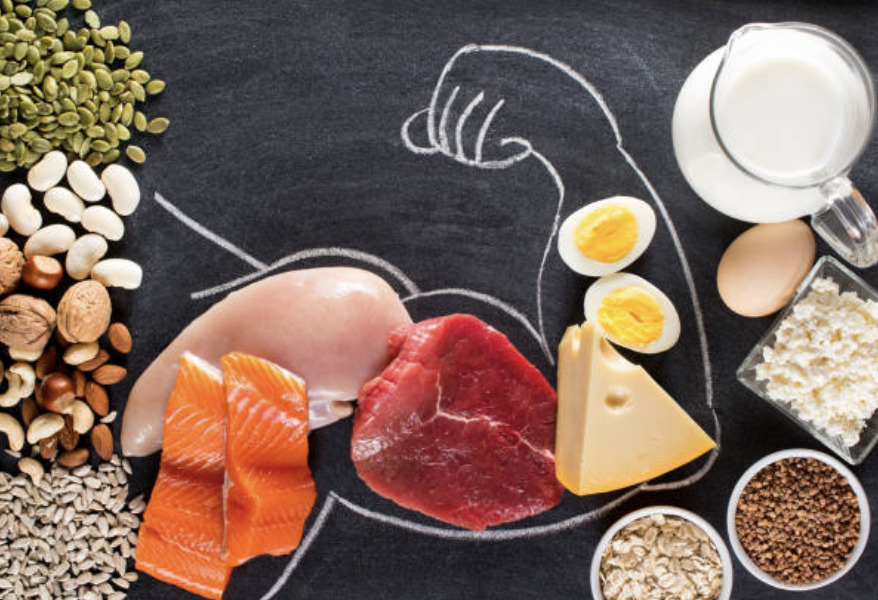When it comes to maintaining a balanced and healthy diet, the importance of protein cannot be overstated. Proteins play a vital role in our overall health and well-being. In this article, we will delve into the significance role of protein in a balanced diet, exploring its functions, sources, and the benefits it offers for our body and mind.
- The Building Blocks of Life: What is Protein?
- The Role of Protein for Tissue Growth and Repair
- The Role of Protein in Energy Production
- Satiety and Weight Management: How Protein Keeps You Full and Supports Weight Loss
- Tailoring Protein Intake to Individual Needs
- Debunking Protein Myths and Misconceptions
The Building Blocks of Life: What is Protein?
The essential role of protein is the overall functioning of our bodies. They act as the building blocks for our muscles, tissues, and organs, providing structure and strength. Think of proteins as the construction workers of our body, working tirelessly to maintain and repair our bodily structures.
Proteins are not only involved in structural support but also have numerous other important functions. They contribute to the proper functioning of our immune system, helping to defend against harmful bacteria and viruses. Additionally, proteins are involved in the production and regulation of hormones, which are responsible for controlling various bodily processes and maintaining balance.
Including protein-rich foods in our diet is vital for promoting a healthy lifestyle. Lean meats like chicken, turkey, and fish are excellent sources of high-quality protein. Plant-based options such as legumes (beans, lentils), nuts, seeds, and tofu are also great choices for obtaining protein. These foods not only provide essential amino acids but also come with additional nutrients like vitamins, minerals, and fiber.
It’s important to strike a balance and include a variety of protein sources in our meals to ensure we obtain all the necessary amino acids our body needs. Incorporating proteins into our diet helps support muscle growth, repair damaged tissues, and aids in recovery after physical activity.
Remember, a healthy lifestyle is not just about protein intake alone. It’s essential to have a well-rounded diet that includes a variety of nutrient-dense foods such as fruits, vegetables, whole grains, and healthy fats. By making informed choices and incorporating protein-rich foods into our daily meals, we can support our overall health, promote muscle strength, and enjoy the benefits of a balanced diet.

The Role of Protein for Tissue Growth and Repair
Another critical role of protein is in tissue growth and repair within our bodies. When we think of tissues, we often imagine our muscles and skin, but it goes beyond that. Our organs, blood vessels, and even the cells themselves rely on proteins for their growth, maintenance, and repair.
Proteins are made up of amino acids, which act as the building blocks for these vital components. When we consume protein-rich foods, our bodies break down the proteins into these amino acids. These amino acids are then transported throughout the body, where they are utilized to build and repair tissues.
One of the key aspects of protein in tissue growth and repair is its role in muscle development. During physical activities like exercise, our muscles experience small tears and damage. Protein steps in to repair these damaged muscle fibers, making them stronger and more resilient. This is why protein is highly valued by athletes and fitness enthusiasts, as it aids in muscle recovery and growth.
Not only does protein support muscle repair, but it also contributes to the maintenance and repair of other tissues in the body. For example, proteins are essential for the healing of wounds and injuries. They assist in the formation of new blood vessels, collagen production, and the regeneration of damaged cells.
To ensure proper tissue growth and repair, it’s important to consume an adequate amount of protein in our diet. Good sources of protein include lean meats, fish, poultry, eggs, dairy products, legumes, nuts, and seeds. By incorporating these protein-rich foods into our meals, we provide our bodies with the necessary amino acids to support tissue repair, growth, and overall health.

The Role of Protein in Energy Production
When we consume protein-rich foods, our body breaks down the proteins into amino acids. These amino acids can be utilized in various ways, one of which is energy production. While carbohydrates are efficiently converted into energy, proteins can also be converted into glucose through a process called gluconeogenesis. This allows proteins to serve as an alternative energy source when carbohydrates are limited.
It’s important to note that protein’s primary role is not energy production but rather tissue repair, growth, and other vital functions. However, in certain circumstances, protein can contribute to energy needs. Approximately 4 calories per gram of protein can be derived as energy. Compared to carbohydrates, which also provide 4 calories per gram, protein digestion and conversion into energy require more complex processes, resulting in a slower and more sustained release of fuel.
It’s worth mentioning that relying solely on protein for energy can have drawbacks. Protein should primarily be consumed to meet the body’s protein needs, which are essential for tissue maintenance and repair. Consuming excessive amounts of protein for energy purposes may lead to an imbalance in nutrient intake and potentially put strain on the kidneys.
To ensure optimal energy production, it’s essential to have a well-rounded diet that includes an adequate intake of carbohydrates, proteins, and healthy fats. Carbohydrates remain the body’s preferred and most efficient energy source. However, incorporating protein-rich foods, such as lean meats, fish, dairy products, legumes, and nuts, can provide a secondary source of energy and support overall nutrition.

Satiety and Weight Management: How Protein Keeps You Full and Supports Weight Loss
Protein plays a crucial role in promoting satiety and supporting weight management. When it comes to feeling full and satisfied after a meal, protein takes center stage.
Protein-rich foods have a high satiety value, meaning they keep you feeling fuller for longer. This is due to several factors. First, protein takes longer to digest compared to carbohydrates and fats, requiring more energy and time to break down. As a result, it slows down the emptying of the stomach, prolonging the feeling of fullness. Secondly, protein stimulates the release of hormones, such as peptide YY and glucagon-like peptide-1, which send signals to the brain to reduce appetite and increase satiety.
Research has shown that increasing protein intake can have a significant impact on weight management. One study published in the American Journal of Clinical Nutrition found that a higher protein diet resulted in greater feelings of fullness and reduced calorie intake throughout the day. Another study published in the Journal of the American College of Nutrition showed that increased protein intake was associated with improved weight loss and body composition.
Incorporating protein-rich foods into your meals can aid in weight loss efforts. Not only does protein help you feel satisfied, but it also plays a crucial role in preserving lean muscle mass during calorie restriction. This is particularly important as maintaining muscle mass can support a higher metabolic rate, contributing to more efficient calorie burning.
Including a variety of protein sources in your diet is essential for overall health and weight management. Lean meats, poultry, fish, eggs, dairy products, legumes, nuts, and seeds are all excellent sources of protein. These foods not only provide essential amino acids but also come with additional nutrients, such as vitamins, minerals, and healthy fats.
Tailoring Protein Intake to Individual Needs
Tailoring protein intake to individual needs is crucial for optimizing health and achieving personal goals. The recommended dietary allowance (RDA) for protein intake is 0.8 grams per kilogram of body weight per day. However, this general guideline may not be suitable for everyone, as protein needs can vary based on factors such as age, activity level, and overall health.
For individuals engaged in regular physical activity or strength training, protein requirements may increase. Research suggests that athletes and active individuals may benefit from a protein intake of 1.2 to 2.0 grams per kilogram of body weight per day to support muscle repair, recovery, and growth. In fact, a study published in the Journal of the International Society of Sports Nutrition found that consuming protein at the upper end of this range (2.0 grams per kilogram of body weight) resulted in greater muscle protein synthesis and improvements in body composition.
Similarly, older adults may also have higher protein needs. Aging is associated with a gradual loss of muscle mass and strength, known as sarcopenia. Adequate protein intake, along with regular resistance exercise, is essential for preserving muscle mass and function. Some research suggests that older adults may benefit from a protein intake of 1.2 to 1.6 grams per kilogram of body weight per day to counteract age-related muscle loss.
It’s important to note that excessively high protein intake may not provide additional benefits. It could potentially strain the kidneys in individuals with pre-existing kidney conditions. Therefore, it’s crucial to consult with a healthcare professional or registered dietitian to determine the appropriate protein intake based on individual needs and goals.
Debunking Protein Myths and Misconceptions
Protein myths and misconceptions are abundant in the realm of nutrition. Let’s debunk some of these misconceptions and shed light on the truth surrounding protein.
Myth 1:
“Eating too much protein will damage your kidneys.” This is a common concern, but it is largely unfounded. Research indicates that protein intake within recommended levels is safe for most healthy individuals. In fact, a study published in the Journal of Nutrition found no adverse effects on kidney function in healthy individuals consuming high-protein diets, even up to 2.8 grams per kilogram of body weight per day.
Myth 2:
“Plant-based proteins are inferior to animal-based proteins.” This is not true. While animal proteins are considered complete proteins, providing all essential amino acids, plant-based proteins can also be combined to achieve a complete amino acid profile. For example, combining legumes with grains or seeds creates a complementary protein source. Additionally, plant-based proteins offer various health benefits, such as being lower in saturated fat and cholesterol and higher in fiber and phytochemicals.
Myth 3:
“Protein powders are necessary for muscle gain.” While protein powders can be convenient, they are not essential for muscle gain. Adequate protein intake can be achieved through whole foods alone. For example, a 3-ounce serving of chicken provides approximately 21 grams of protein, equivalent to what many protein powders offer. It’s important to prioritize a well-rounded diet that includes lean meats, poultry, fish, legumes, nuts, seeds, and dairy products to meet protein needs.
Myth 4:
“Protein consumption leads to weight gain.” The truth is that weight gain occurs when there is an overall caloric surplus, regardless of the macronutrient composition. However, protein can actually aid in weight management. It promotes satiety, reduces appetite, and helps preserve lean muscle mass, which is important for maintaining a healthy metabolism. Research suggests that increasing protein intake while controlling overall calorie intake can support weight loss and improve body composition.
Understanding the truth about protein is vital for optimizing nutrition and overall well-being. By dispelling myths and embracing evidence-based information, we can make informed choices to support our health goals. Whether it’s building muscle, managing weight, or promoting satiety, protein plays a crucial role. Let’s embrace the power of protein and make educated decisions to nourish our bodies effectively.

[…] that provide quick energy followed by a crash, nutritious snacks containing complex carbohydrates, protein, and healthy fats offer a steady release of energy, keeping children fueled and […]
[…] Protein, an essential macronutrient, has been found to have a unique ability to induce feelings of fullness and reduce subsequent food intake. Numerous studies consistently demonstrate that protein-rich meals promote greater satiety compared to meals with lower protein content. […]